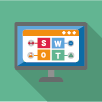Database
The Inclusive Higher Education Database consists of 47 examples and information about inclusive policies and practices in higher education institutions in Europe.
Use it together with the assessment, reflection and analysis tools (e.g. the Checklist, Canvas and SWOT-analysis template) in order to compare, reflect and analyze the challenges and opportunities identified in your institution or department.
Use it as a source of information and inspiration regarding good policies and practices of inclusive higher education, which may support you in drafting strategic goals for inclusion (using the Inclusive Higher Education Strategy Worksheet).
Access and browse the database or access and filter according to country or the challenges that your institution is facing with regard to inclusive policies, practices, or accessibility.
Report on Higher Education in Cyprus
- Keywords: Financial support, Students with disabilities
The report concerns the provision of equal access opportunities in HEIs in Cyprus. The Ministry of Education and Culture acknowledges the fact that opportunities to HE should be given to the largest possible proportion of the population and is taking measures to meet this target. In addition, the Ministry has set as a priority to enhance the participation of emigrants, disadvantaged and other underrepresented groups in the HE System of the country. The report presents specific measures to ensure equal access rights for underrepresented groups (based on socioeconomic status, disability and on their participation in religious groups) in public and private universities.
Link- Policy
- Cyprus
Strategic framework for a fair higher education system
- Keywords: Students with disabilities
This report offers an analysis of the Romanian higher education system, focusing especially on participation rates, and formulates solutions to foster integration and equal participation of students from disadvantaged groups including young people from rural areas, students with disabilities, students with low socioeconomic status, and Roma students. This report was developed as part of a project co-financed by the European Structural Funds.
Link- Policy
- Romania
Higher education reform in Romania: proposals for change for an honest, efficient and inclusive system)
- Keywords: Inclusive teaching and learning
This study analyses the quality of the Romanian higher education system, starting from the fundamental missions of tertiary education: teaching, research and social mission, in order to train active citizens and the future main actors and professionals in the country. It formulates 12 directions for changing the higher education system in Romania grouped into five main categories: financing mode; administrative capacity; main objectives of higher education; staff recruitment and motivation; the context in which higher education operates.
Link- Policy
- Romania
Gender Equality Plan for 2014-2020
- Keywords: Gender equality, Staff training
The Cyprus University of Technology developed a Gender Equality Plan for 2014-2020, under a Rector’s Council’s decision. The plan concerns all departments and the administration of the University. The working group includes members of the academic and administrative staff, as well as students. The gender equality plan was launched in April 2014 at a dedicated event ‘Gender Equality: Vision 2020’. There is no specific funding available for this plan.
Link- Policy
- Cyprus
Individual Study Arrangements at the University of Aalto
- Keywords: Inclusive teaching and learning, Students support, Students with disabilities
This webpage is describing individual study arrangements at the University of Aalto (FI), available to students. Should the student, due to an impairment restricting his/her ability to study or other health condition, be unable to complete courses as provided in the curriculum or on the course, the school is obligated to take reasonable measures to organise an alternative mode of completing the study attainment. A toolkit is provided teachers to guide them on the types of individual study arrangements students may need and how to implement them.
Link- Policy
- Finland








